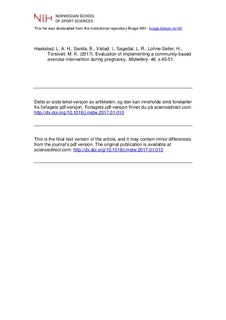Evaluation of implementing a community-based exercise intervention during pregnancy
Haakstad, Lene Annette Hagen; Sanda, Birgitte; Vistad, Ingvild; Sagedal, Linda Reme; Lohne-Seiler, Hilde; Torstveit, Monica Klungland
Journal article, Peer reviewed
Accepted version
Permanent lenke
http://hdl.handle.net/11250/2496976Utgivelsesdato
2017Metadata
Vis full innførselSamlinger
Sammendrag
Objective: To evaluate the implementation of a community-based exercise intervention (the Norwegian Fit for Delivery study) during pregnancy. Design: Descriptive, explorative. Setting: Healthcare clinics in southern Norway, including urban and rural settings. Participants: Healthy, nulliparous women with singleton pregnancy of ≤20 gestational weeks, age ≥18 years and body mass index ≥19 kg/m2. Methods: Women were randomized to either twice-weekly supervised exercise sessions combined with nutritional counselling (n=303) or standard prenatal care (n=303). The exercise program was based on ACOG guidelines, with the same low-impact workout for all participants, including 60 minutes of moderate-intensity cardiovascular and strength training, performed in a group of maximum 25 women. The aim of the present secondary analysis was to report on the intervention group's experience with participating in an exercise program in the 2nd and 3rd trimester, including satisfaction, adherence, adverse effects, as well as motives and barriers for attending the classes. Results: Of 303 women randomized to exercise, 274 (92.6%) attended at least one class and 187 (68.2%) completed a questionnaire after completion of the trial assessing their experience with the group sessions. For 71.7%, self-reported exercise dosage was ≥75% of the twice-weekly exercise program and more than seven out of 10 reported to be satisfied or very satisfied with the exercise sessions. A total of 95.1% answered that they would recommend this type of exercise for pregnant friends. Reported motives and health benefits included better aerobic capacity, increased energy levels and exercise enjoyment. No harmful effects of the exercise intervention were noted in the mother or the fetus. Key conclusions and implications for practice: Results demonstrated that regular group exercise was feasible, safe, and well tolerated in pregnancy, which may encourage incorporating this program into a routine health care setting.
